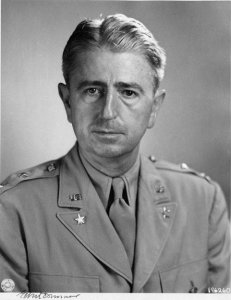![]() The Pacific War Online Encyclopedia
The Pacific War Online Encyclopedia
|
| Previous: Weather | Table of Contents | Next: Wei Li-huang |

U.S. Army. Via University of Utah
Albert Wedemeyer ws born in Nebraska and graduated
from West Point in 1918, seeing
no combat in the First World War. He served in China in 1930-32 and became fluent in
the
language. He was a 1936
graduate of the Command and General Staff School and attended the
German Kriegsakademie in
1936-1938. Probably the Army’s foremost
expert on the German war machine, he spoiled his usefulness through his
strong
isolationist stance and his Anglophobia, which gave him the appearance
of a German
sympathizer and
made him a prime suspect in several leaks of U.S. war plans to the press
before
war broke out in the Pacific.
The most serious such leak was of the Victory
Program, Wedemeyer's contingency plan for war with Germany if the U.S. was unable to
remain neutral. One of
the 35 copies of the plan found its
way into the hands of Robert McCormick's Chicago Tribune, which published
portions of the
plan on 4 December 1941, just three days before war broke out in the
Pacific. FBI investigators never determined how the plan was leaked,
but Wedemeyer remained under a cloud of suspicion of having leaked his
own report. Wemeyer insisted to the end of his life that he
had nothing to do with the leaks, and he credited Marshall with providing the
crucial support that saved his career. Fleming (2001) claims to have
traced the leak as far back as "Hap"
Arnold, chief of the Army Air Forces, and suggests that Roosevelt himself
leaked the Victory Program, as a way to provoke Germany into declaring war
on the United States if the United States found itself at war with Japan.
Historians have long believed that the Victory Program ultimately became the basis for the successful Allied global strategy, even though Wedemeyer was only a major in the War Plans Division when the report was prepared. This belief has been called into question by Lacey (2011), who has carefully debunked the claim that Wedemeyer's Victory Program had anything to do with the actual Victory Plan. Lacey describes Wedemeyer's Victory Program as "analogous to any one of hundreds of PowerPoint presentations given to Pentagon audiences every month— over in an hour and just as quickly forgotten." According to Lacey, it was actually Harold Stark and economist Stacy May of the War Production Board who were responsible for laying the foundations for the military and economic strategy that won the war. However, the volume of the Army's official history that discussed prewar strategic planning was based almost entirely on interviews with Wedemeyer, who also deliberately conflated the Victory Plan with his own Victory Program in his autobiography
Wedemeyer remained in the war plans division in Washington until September 1943, when he was promoted to major general. He served briefly as an observer in Europe, and then was sent to India to serve as deputy chief of staff under Mountbatten in October 1943. In October 1944, he relieved Stilwell as chief of staff and chief American military advisor to Chiang Kai-shek after the latter insisted on Stilwell’s recall. (Stilwell's other titles, deputy commander of SEAC and Northern Combat Area commander, went to Wheeler and Sultan.) Wedemeyer served in China the remainder of the war. He was promoted to lieutenant general in January 1945.
Postwar, Wedemeyer was given command of 2 Army and joined Marshall on his mission to China. Wedemeyer correctly predicted the Communist victory in the civil war, which he blamed on the failure of the United States to give effective support to the Kuomintang. He was commander of 6 Army until his retirement in July 1951, where he became active in Republican politics and on the boards of several corporations. He was awarded the Presidential Medal of Freedom in 1985.
Wedemeyer stood 6'5" (196 cm) and was described by Roosevelt's chief of staff, Admiral William Leahy, as a man of "superlative integrity" (Fleming 2001). This was not a universal view. While serving as one of Marshall's senior planners, Wedemeyer installed a secret tape record in his desk with which he recorded his conversations with British officers from the Joint Planning Staff. Allen (1984) described him as "ambitious and conceited" and Stilwell wrote in his diary in June 1944: "Good G-d — to be ousted in favor of Wedemeyer — that would be a disgrace" (Allen 1984).
| 1896-7-9
|
Born in Omaha, Nebraska |
|
| 1918 |
Second
lieutenant |
Graduates from West Point,
standing 270th in a class of 285. |
| 1930 |
5 Infantry Regiment, China |
|
| 1934 |
Command and General Staff School |
|
| 1936 |
Resident in Germany, attending Kriegsakademie |
|
| 1941 |
Major |
War Plans Division |
| 1943-9 |
Major General |
Deputy chief of staff, Southeast
Asia
Command |
| 1944-10-31
|
Commander, U.S.
Army Forces, China Theater |
|
| 1945-1-1 |
Lieutenant general |
|
| 1946-5-1 |
Commander, 2 Army |
|
| 1947-10-31 |
Head, Plans and Operations
Division |
|
| 1949 |
Commander, 6 Army |
|
| 1951-7-31 |
Retires |
|
| 1954-8-4 |
General |
Honorary promotion |
| 1989-12-17 |
Dies at Fort Belvoir, Virginia |
References
Command
and
General Staff School (accessed 2009-10-25)
Eiler
(2001; accessed 2010-3-10)
The Pacific War Online Encyclopedia © 2007-2012 by Kent G. Budge. Index